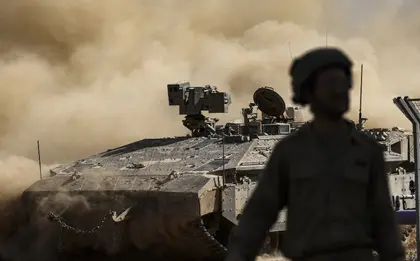Israeli forces were Sunday readying for a looming Gaza ground invasion aimed at destroying Hamas, the Palestinian Islamist militant group that unleashed the bloodiest attack in the country's history.
In the eight days since Hamas gunmen killed more than 1,300 Israelis in their surprise onslaught, Israel has responded with a devastating bombing campaign that has claimed over 2,300 lives in Gaza.
JOIN US ON TELEGRAM
Follow our coverage of the war on the @Kyivpost_official.
Fear and chaos reigned in the 40-kilometre (25-mile) long strip that is one of the world's most densely populated areas and where the UN estimated that one million have been displaced in the war's first week.
Entire Gaza city blocks lay in ruins and hospitals were overflowing with thousands of wounded in the besieged territory, but there were fears of worse to come.
A bereaved and infuriated Israel has massed forces outside the long-blockaded enclave of 2.4 million in preparation for what the army has said would be a land, air and sea attack involving a "significant ground operation".
Israel has also stationed troops and tanks on its UN-patrolled northern border with Lebanon and closed a four kilometre (2.5 mile) wide zone there to civilians after deadly exchanges of cross-border fire with Iran-backed militant group Hezbollah.
- 'More is coming' -
Israeli Prime Minister Benjamin Netanyahu visited front line troops in the south near Gaza on Saturday, wearing a flak jacket. "Are you ready for what is coming?" he said. "More is coming."

World Briefing: January 16, 2025
Israel's military spokesmen have repeatedly said that the army is ready for a ground operation but awaiting a "political decision" on the timing.
Special forces have made forays into Gaza and recovered the bodies of some of the 126 confirmed hostages taken by Hamas, the army said without specifying how many.
A Gaza ground invasion threatens to bring the kind of gruelling house-to-house fighting that devastated Iraq's Mosul and Fallujah in years past, further complicated for Israeli forces by Hamas' vast tunnel network.
Israel has warned 1.1 million Palestinians to leave northern Gaza and a steady stream of families in overloaded cars, trucks and donkey carts have since headed south.
Israel has accused Hamas of blocking them from fleeing in order to use them as "human shields".
- 'Catastrophic situation' -
Alarm has grown about a wider humanitarian disaster in Gaza where Israel has cut off water, food and power, vowing to maintain the complete siege until all hostages are freed.
"An estimated one million people have been displaced in the first seven days" of the war in Gaza, Juliette Touma of the UN agency supporting Palestinian refugees told AFP.
"The situation is catastrophic," said Jumaa Nasser, who travelled from Beit Lahia in northern Gaza with his wife, mother and seven children. "We've had no food or sleep. We don't know what to do. I've given my fate up to God."
China's Foreign Minister Wang Yi charged that Israel's actions have gone "beyond the scope of self-defence" and said it must "cease its collective punishment of the people of Gaza".
Egypt to the south controls the only other crossing with Gaza but has so far refused to open it to help evacuate foreign citizens unless aid convoys are allowed to enter, according to unnamed intelligence sources cited in media reports.
Anger has flared in much of the Muslim world and beyond, with pro-Palestinian protesters burning Israeli and American flags.
Militant groups allied with Israel's arch foe Iran have a strong presence in Lebanon and Syria, heightening the risk of a multi-front war for Israel's army as deadly clashes have also flared in the occupied West Bank.
The United States has deployed a second aircraft carrier to the region in an effort to "deter hostile actions against Israel", Secretary of Defense Lloyd Austin said.
- Grief and fury -
The mood in Israel has swung between collective grief, fury and a strong desire to punish Hamas which Netanyahu has likened to the Islamic State group.
Public outrage has been fuelled by images and reports virally shared on social media of youths and families shot, stabbed, burnt and mutilated in the Hamas attack, and by deep fears about the hostages.
"We must bring them back home alive," said a tearful Yrat Zailer, the aunt of children aged nine months and four years who were abducted with their mother.
Israel pushed on with its evacuation of southern towns close to Gaza that were targeted in the Hamas attacks. Packed buses were taking families to hotels in Jerusalem and the Red Sea resort city Eilat.
"It's hard, I'm crying," said Helen Afteker, 50, an evacue from the town of Sderot. "It's terrifying every time there's a warning, we have to leave. It's better for the children."
Planeloads of Israelis have returned from around the world to join the latest of the many wars in Israel's 75-year history.
The foreign minister of Israel's arch foe Iran, Hossein Amir-Abdollahian, warned that if Israel's attacks "against the defenceless ... people of Gaza continue, no one can guarantee the control of the situation and the non-expansion of the conflicts".
Over the past week, Israel has levelled thousands of buildings in Gaza while Hamas has fired thousands more rockets at Israel, most intercepted by missile defence systems.
Gaza's electricity outage threatens to cripple the enclave's life-support systems, from sea water desalination plants to food refrigeration and incubators in hospitals.
Pope Francis called for humanitarian corridors in Gaza and urged that "children, the sick, the elderly, women and all civilians should not fall victim to the conflict".
"There have already been so many deaths, please let's not shed any more innocent blood," he said, castigating "the diabolical force of hatred, terrorism and war".
You can also highlight the text and press Ctrl + Enter










